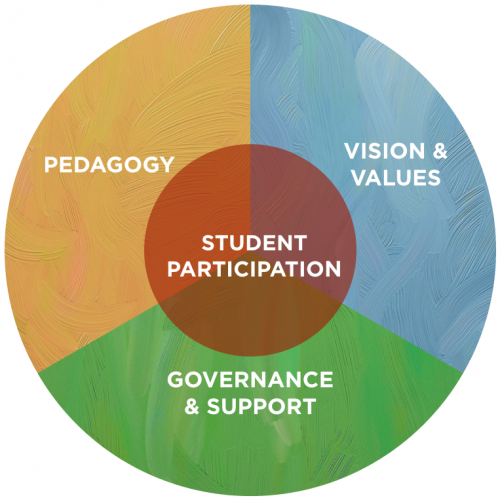 To promote and develop education for sustainability in higher education, participants from six institutions across the Nordic countries participated in the project ActSHEN – Action for Sustainability in Higher Education in the Nordic region. The project was funded by NordPlus. The aim of the ActSHEN project at the outset was to develop a model and guidelines that strengthen student-driven pedagogy when working with sustainability in higher education.
To promote and develop education for sustainability in higher education, participants from six institutions across the Nordic countries participated in the project ActSHEN – Action for Sustainability in Higher Education in the Nordic region. The project was funded by NordPlus. The aim of the ActSHEN project at the outset was to develop a model and guidelines that strengthen student-driven pedagogy when working with sustainability in higher education.
Project work began in September 2013. In the application it was suggested that effective educational action for sustainability is based on three core principles:
- Developing cross-disciplinary knowledge about and for sustainable development.
- Encouraging respect for and about various forms of sustainability knowledge.
- Nurturing a sense of shared responsibility to create shared value for our common future.
These principles also require authenticity i.e. the instructors, mentors or tutors working with students must have credibility with those students arising from their own practice and beliefs.
These principles were used as the basis for the implementation of the project, which was further guided by two specific questions:
- What types of student-driven activities in higher education lead students, teachers and staff to richer understanding and better preparedness to work with sustainability issues?
- What actions are needed to support and encourage university teachers and students who wish to work with and for sustainability?
In particular the project team wanted to investigate ways in which participatory and collaborative education for sustainability can be strengthened in universities. As the project developed, the team decided that the idea of an educational model was too rigid, and instead focused on developing a set of guiding principles to strengthen student-driven pedagogy when working with sustainability in higher education.
Helsinki Framework
During the meeting held in Helsinki in 2014, the group developed a set of guiding principles based on shared understanding of sustainability in higher education. These Helsinki principles were used to inform the design and implementation of the pilot courses. Depending on the context of the pilot, the application of these principles varied. The principles described three dimensions of education for sustainability: educational outcomes, management and pedagogical practices. As sustainability in higher education demands in-depth institutional changes and fundamental challenges to conceptions of how education is best organised around the traditional roles of students and teachers, a main focus was on enhancing student participation on all of these dimensions.
In March 2016, after two years of piloting and experimenting, the project team met to conduct a final critical reflection on the project outcomes and how these should be documented. The meeting was facilitated by Stephen Sterling acting as a critical friend. It was during this meeting that the Helsinki principles were revisited and reviewed in terms of their purpose now that the pilot initiatives had come to an end. The outcome of the critical dialogue was that the guiding principles should be developed into a final framework, referred to as the Helsinki framework, representing elements that project team members believe to be central to working with sustainability education.
The purpose of the framework was to provide ideas for embedding sustainability awareness and action in higher education. It has three dimensions:
- Vision and Values
Sustainability education necessitates a holistic and systemic approach in order to bring about individual and organizational changes. - Pedagogy
Sustainability educational necessitates flexible and experimental pedagogical approaches. - Governance and Support
Sustainability education necessitates more inclusive and distributive leadership.
A main focus should be on enhancing student participation on all of these dimensions. Students should occupy a central role in decision making and have influence on what, how and where they learn.

The case studies
The case studies presented here focus on our experiences of running pilot initiatives and our critical reflections during this project.